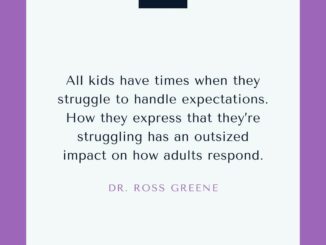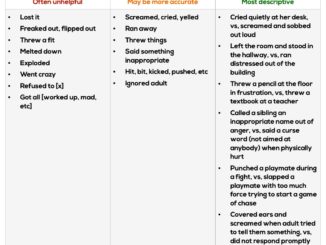(All I’m doing in this post is describing adult/child interactions that I observed, but I want to give you a heads up that it’s kind of infuriating. I think that’s important to share and to talk about, but I wanted to put this heads-up here because I know that some readers have been more intensely subject to experiencing this type of treatment from adults in their childhood or adulthood, and so I just wanted you to know before going in.)
I had an incident where schedules got mixed up. The result was that another staff member, who doesn’t usually come into my therapy gym, came to pick up a child from my gym, rather than the usual routine of me walking the child to their next location.
This adult was not at all used to the way things run in my room. When the student told me “I’m going to carry a dinosaur in the hallway,” the adult told them, “That’s not the appropriate way to ask permission.”
I said, “They don’t need permission. They always do this, it’s part of our routine.”
The staff member wanted to save face. They stammered, “Well, are they taking the dinosaur and keeping it or just carrying it?”
I said, “Carrying it in the hallway. It’s allowed. It’s fine with me. They already know that.”
The adult turned to the child and said, quite unnecessarily, “Well then, when we get to the next room, you have to give it back.”
Which the child already knew; they had done this routine every week for two years, and they were making no indication that they had any intention of doing otherwise. The staff member’s need to not “be wrong”, to do something “instructional”, was getting in the way of them just…being quiet, letting us do our thing.
We walked out into the hall. My student said, “I hope we don’t walk past that scary beetle I saw earlier.”
“What, a beetle? How scary could a beetle be?” said the adult.
My student bristled a little bit at being dismissed this way. “It WAS scary.”
“Well, how big was it?” asked the adult.
My student held up fingers apart from one another and said “this big.”
To which the adult replied, “I bet it was only this big,” and held up fingers smaller than that. “Where did you even see it anyway?”
My student, frustrated, said, as politely as they could, “Can I stop asking you questions about this now?”
The adult gave me an amused glance, like adults do when they expect to share a joke, and said, “what, huh? You ask me questions? You’re not asking me any questions.”
Now in a frustrated tone of voice, my student yelled, “can YOU stop asking ME!!”
The adult said, “First of all, that’s not an appropriate way to speak to me. And second of all, yes. That’s all you had to say. There is no reason to get so worked up about this.”
It had been a grand total of about 120 seconds, and I wanted to throw things and scream. I couldn’t imagine how my student was feeling.
I had a meeting with this staff member a day later. It was about something else, but my frustration on behalf of my student was boiling just under the surface as I tried to keep it in control. I tried to diplomatically say, “I know the two of us have very different philosophies about working with children.”
“Yes,” said the other adult. “I know you see them occupationally and I see them educationally. They have so much potential, but no boundaries. The way you let them behave in your room carries over into the rest of their day, and they think they can just talk to any adult like that. I can’t let them act that way.”
But I don’t want them to have to ask permission to have an idea.
I certainly don’t want them to ask permission to follow a routine.
I don’t want to tease them when they’re feeling dismissed and belittled.
I don’t want to brush off their fears.
I don’t want to pretend I don’t understand what they’re communicating.
I don’t want to push them to breaking and then fault them for breaking.
A few days later, we had ironed out the schedules. It was time for me to pick up the student from the staff member’s room. When I arrived the student saw me and lit up and slipped out quietly.
“Hang on,” I said. “I want to catch [adult]’s attention so they know we left and know where you are.”
“Okay,” my student said, and then, “[Adult], I’m going to OT!”
And the adult said, “I am teaching right now. You may leave my room silently.”
And I thought…my children, my heart, I am so sorry. You can’t win. You are over-policed for every single little thing you say or do. You can’t win.



